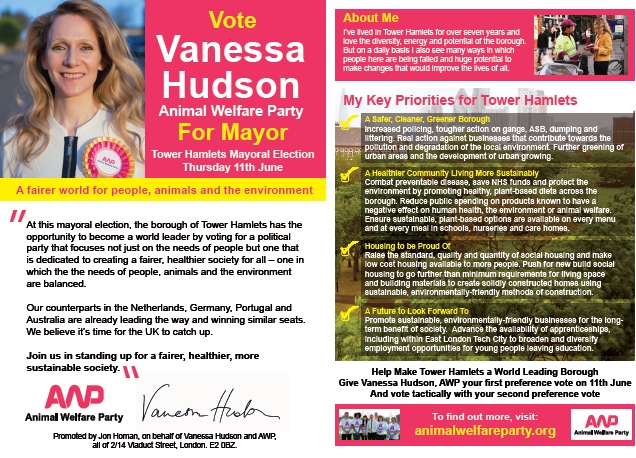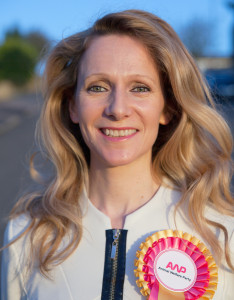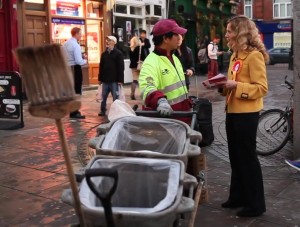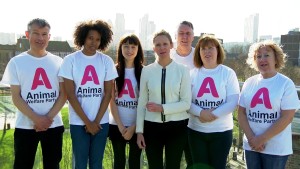2015 Tower Hamlets Mayoral Election – Thursday 11th June
The Tower Hamlets Mayoral Election took place on Thursday June 11th 2015 and Vanessa Hudson stood as the Animal Welfare Party candidate.
The election came about after an election court found the previous mayor, Lutfur Rahman, guilty of corrupt and illegal practices and ruled that his re-election in May 2014 should be declared void.
There were 10 candidates in the mayoral contest and the results can be viewed below.
AWP thanks all those who generously made donations to help fund the party’s deposit and election campaign.
| Election Candidate | Party | 1st Pref | % | 2nd Pref | % | Total | |
|---|---|---|---|---|---|---|---|
| Labour | 27255 | 40.00% | 5499 | 89.85% | 32754 | Elected | |
| Independent | 25763 | 37.81% | 621 | 10.15% | 26384 | Not elected | |
| Conservative | 5940 | 8.72% | Not elected | ||||
| Green | 2678 | 3.93% | Not elected | ||||
| Liberal Democrat | 2152 | 3.16% | Not elected | ||||
| Red – Flag Anti-Corruption | 1768 | 2.59% | Not elected | ||||
| United Kingdom Independence Party (UKIP) | 1669 | 2.45% | Not elected | ||||
| Independent | 316 | 0.46% | Not elected | ||||
| Animal Welfare Party | 305 | 0.45% | Not elected | ||||
| Independent | 292 | 0.43% | Not elected |
To download the party’s leaflet for this election please click here.
Our key policies and campaign statement for this election can be viewed below.
Vanessa Hudson
Animal Welfare Party Leader and Tower Hamlets Mayoral Candidate
Campaign Statement
“I’m running for Mayor of Tower Hamlets because I’m amazed and appalled in equal measure at the way other politicians of all parties, at both local and national level, have either no awareness of or no appetite to tackle some of the most serious challenges facing our society today – climate change and environmental degradation, the rise in preventable diseases and the increasing number of animals, now in their billions, suffering at hands of man for reasons that are pretty hard to justify.
The last challenge is of course a moral one. Disagree with my moral stand point on that and it’s easy to reject it – and of course people do and will. But the environmental and health challenges we face are realities that will affect all of us and quite possibly our children and grandchildren, regardless of where they end up living in the world.
The point our party makes and the reason I feel forced to speak out is that these three challenges are all connected and they stem largely from one issue – the way we’re choosing to feed ourselves.
Since the 1950’s, with increasing wealth, there’s been a rise in animal product consumption across the globe. Meals based around meat and fish are now the norm not the exception. Many people know that our human population now stands at 7 billion but we hardly ever hear about our global livestock population, now standing at 23 billion. It’s our gigantic and rapidly growing livestock population and the feeding and watering of these animals that is both a major contributor to greenhouse gas emissions and global warming and which also causes huge resource consumption and environmental degradation around the world.
Livestock farming actually now produces more greenhouse gas emissions than all of the transport sector combined. Rainforest is being cut down at a rate of an acre per second to grow soya beans to feed livestock and fish. Almost one third of the planet’s land is becoming desert – with the vast majority due to livestock grazing. As the world population is set to rise to 10 billion by 2050, the livestock population is set to rise too, further exasperating these problems. If we carry on like this without making any changes to the way we feed ourselves, we’re going to need between three and four planets to sustain ourselves. AWP believes we face a very stark choice between addressing these issues now or accepting that the planet we hand over to our children and grand children may well not be habitable.
Of course, with every food choice we make, those of us living in Tower Hamlets are playing a part in this environmental degradation too but, should we decide we want to, we could play a world-leading role in its solution.
If the environmental consequences of our eating habits don’t alarm us yet, perhaps the health ones should, because there’s no other London borough that exemplifies the terrible health consequences of poor diet more than Tower Hamlets. We have the worst life expectancy in London, a huge problem with diabetes, younger than average cancer deaths, younger than average deaths from heart disease, a higher number of strokes than the national average and, in some of our wards, mortality rates for cardiovascular disease which are close to twice the national average.
And when it comes to the health of our children, the statistics beggar belief – by the time they’re just five years old, 15% of our children are already obese. By the time they’re eleven, the proportion has risen to almost 25%. At the same time, we know that 85% of those eleven-year-olds are not eating the recommended five portions of fresh fruit and vegetables per day.
And that’s the point. The causes of such ill health are not unknown to us. These are chiefly preventable conditions and diseases. Although not the sole cause of our ill health, would reducing our reliance on animal products alleviate some of these problems? Science suggests yes. In fact, nationally, projections are that we could save 45,000 early deaths and the NHS £1.2 billion in funds per year if we cut down on meat consumption to three times per week.
We know what causes the terrible poor health of people living in Tower Hamlets and we know how to solve it but look for the real political will to do so and it’s hard to find. It’s almost as if inequality of health takes a back seat to other forms of inequality.
Are unhealthy and unsustainable food choices and inactivity two areas that local government can influence? I think they are and our addressing them should not be perceived as optional or in some way incompatible with the other important work the new Tower Hamlets administration will have to do.
So, in addition to our policies on creating a safer, cleaner, greener borough, building sustainable housing to be proud of and promoting sustainable environmentally friendly business, we’re giving priority to creating a healthier community living more sustainably.
We want to combat preventable disease, save NHS funds and protect the environment by promoting healthy, plant-based diets across the borough.
We believe we must reduce public spending on products known to have a negative effect on human health, the environment or animal welfare. And we must ensure sustainable, plant-based options are available on every menu and at every meal in schools, nurseries and care homes.
Voters have two choices for Mayor on Thursday 11th June. I hope some will use one of them to show that here in Tower Hamlets there is an appetite for and a belief in a better future for people, the environment and animals.”
Vanessa Hudson
My Key Policies for Tower Hamlets
A Safer, Cleaner, Greener Borough
Increased policing, tougher action on gangs, ASB, dumping and littering. Real action against businesses that contribute towards the pollution and degradation of the local environment. Further greening of urban areas and the development of urban growing.
A Healthier Community Living More Sustainably
Combat preventable disease, save NHS funds and protect the environment by promoting healthy, plant-based diets across the borough. Reduce public spending on products known to have a negative effect on human health, the environment or animal welfare. Ensure sustainable, plant-based options are available on every menu and at every meal in schools, nurseries and care homes.
Housing to be Proud Of
Raise the standard, quality and quantity of social housing and make low cost housing available to more people. Push for new build social housing to go further than minimum requirements for living space and building materials to create solidly constructed homes using sustainable, environmentally-friendly methods of construction.
A Future to Look Forward To
Promote sustainable, environmentally-friendly businesses for the long-term benefit of society. Advance the availability of apprenticeships, including within East London Tech City to broaden and diversify employment opportunities for young people leaving education.”






